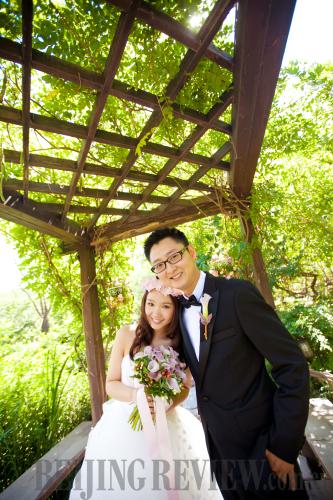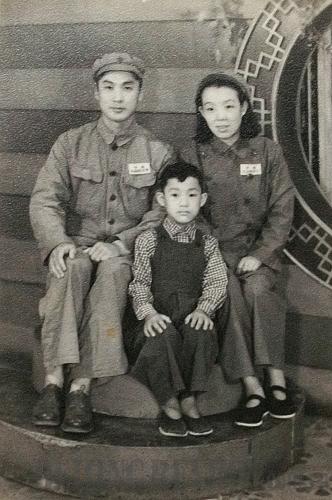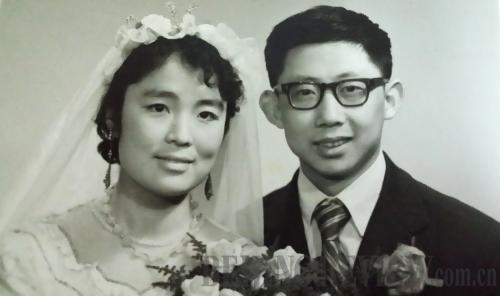|
 |
|
Wang Muqing and Liu Cong in one of her wedding gowns in 2012 (COURTESY OF WANG MUQING) |
Though photography as we know it has existed for just 175 years, going to a photo studio and capturing meaningful moments on film has long been a popular diversion for Chinese families. Nearly every family keeps a stack of time-worn photos, taken on everything from black-and-white film to an iPhone, recording the growth of a small faWang Muqing's maternal grandparents and his uncle in 1952
mily into a large one or how a baby grew into a teenager and then into a parent. Photos preserve the clothing, faces, hairstyles and landscapes of their time period; they serve as invaluable documents, collecting swathes of historical information into timeless, images.
Now, following almost two centuries of technological advances, digital cameras and smart phones enjoy wide use in China. Photography has become as basic and accessible as pen and paper, no skills required. Compared to years past, taking a family portrait is no longer the time-honored tradition and drawn-out affair it once was. No longer is a story of a thousand words told in one family selfie. Young people, view digital photos as dime-a-dozen shots, never intended to be printed and carefully handed down from generation to generation.
Some younger members of long family lines, however, are just beginning to sort through these piles of old photos and portraits and learn the stories behind them. They hope to record the history of their families, their country, and the passage of time with these images.
Wang Muqing, 32, a Beijing resident born in Xi'an, the capital of western China's Shaanxi Province, has stumbled upon such interesting stories through old family photographs. Here, Wang shares over 60 years of his family's history in three images—taken in the years of 1952, 1982 and 2012, respectively.
 |
|
Wang Muqing's matermal gradparents and his uncle in 1952 (COURTESY OF WANG MUQING) |
The oldest of the three photos, taken in 1952, depicts Wang's maternal grandparents and uncle. That year, Wang's grandfather, Wang Yunxun, returned to Beijing from the battlefields of the Korean War (1950-53). Wang's grandmother, Liu Jingyi, was also serving in the People's Liberation Army (PLA) at that time. As seen here, both Wang and Liu chose to appear in uniform and the boy—their first-born, Wang Yandi—wore homemade blue trousers with suspenders and a checkered shirt, popular garments for Chinese children in the 1950s.
Wang and Liu went on to have a total of four children. At that time, the more offspring a family had, the more illustrious and respected they were. Having a large family was also encouraged by the government, helping to rebuild a newly founded People's Republic of China devastated by years of costly wars and famines.
Wang Yunxun is now 90 years old; his wife passed away in 2012. Though his sons and daughters live in Beijing, Wang resides in Xi'an, where his children take turns visiting him. Traditionally, few Chinese people move into nursing homes when they get old, instead preferring to live together with their children.
 |
|
Wang Muqing's parents in 1982 (COURTESY OF WANG MUQING) |
Beijing's renowned Dabei Photo Studio, established in 1921, has been a favorite studio for new couples and families for nearly a century. In this photograph, taken there in 1982, Wang Muqing's parents can be seen in fancy wedding attire (clothes rented from the studio for the occasion). During this time period, in an era of low income and a shortage of commodities, Chinese couples could not afford to buy wedding suits or dresses. A simple and frugal ceremony was de rigueur.
Prior to his marriage, Wang Xiangwen, Wang Muqing's father, was recommended to enlist at a university in 1975. He was lucky. During the "cultural revolution" (1966-76), receiving a university education depended highly on family background and winning the government education organization's endorsement. Widespread access to higher education was not normalized until the end of 1977.
As for Wang Mei, Wang Muqing's mother, prior to marriage, her youth was full of twists and turns. Also affected by the "cultural revolution," she was sent to China's southwestern Yunnan Province in 1968, at the age of 16, as part of Chairman Mao Zedong's directive for millions of teenaged urban youths to relocate to rural areas to learn about farm work. The period's large-scale migration had far-reaching effects on the whole generation. For example, during her time in the south, Wang Mei's parents moved from Beijing to Xi'an—due to poor communication, Wang Mei had no knowledge of this until she returned to Beijing four years later.
As seen here in 2012, Wang Muqing married Liu Cong in Beijing. Unlike Wang's parents, the newlyweds wore expensive tailor-made wedding attire for the photo. Today, almost every new couple like Wang and Liu take a series of artistic wedding photographs to preserve such celebratory moments.
Wang was born in Xi'an in 1982, under the umbrella of the family planning policy, which was introduced in 1979 to alleviate social, economic, and environmental problems caused by surging population. He now works as a public servant in Beijing, following graduation from Beijing Sport University in 2005. Like his father's generation and the generation before that, Wang believes living a happy and healthy life is everything that matters.
Email us at: weiyao@bjreview.com |
